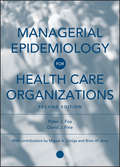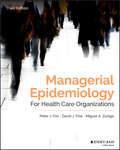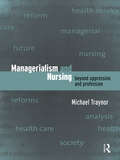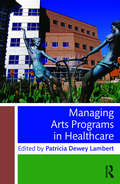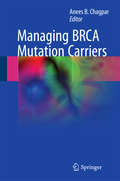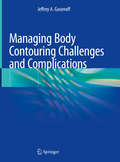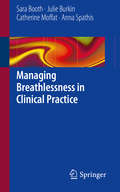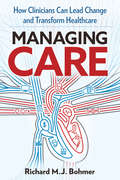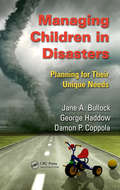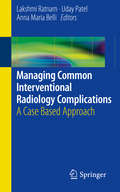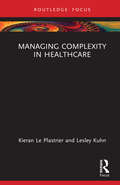- Table View
- List View
Management, beheer en organisatie voor tandartsassistenten (Basiswerk AG)
by Maria de Vries Elly HogeveenDit studieboek geeft de tandartsassistent (in opleiding), officemanagers, praktijkmanagers en praktijkeigenaren tools en richting in de uitvoer van management-, beheer- en organisatorische taken. Het behandelt de huidige wet- en regelgeving waaraan mondzorgpraktijken zich moeten houden. Ook geeft het een inkijk in mogelijke bij- en nascholing, beheertaken, kwaliteitszorg, samenwerken en het begeleiden van een stagiair of een nieuwe collega. Dit boek neemt je mee in de dagelijkse gang van zaken binnen een mondzorgpraktijk. Als tandartsassistent werk je niet alleen aan de stoel, maar heb je veel andere taken die belangrijk zijn om een mondzorgpraktijk draaiende de houden. De theorie is aangevuld met beeldmateriaal, handige lijstjes en verwerkingsopdrachten om de theorie beter te leren begrijpen. Elly Hogeveen is van oorsprong tandarts- en preventieassistent en is docent aan de opleiding tot tandartsassistent aan ROC Friese Poort in Leeuwarden. Ook is zij praktijkmanager in een tandartsenpraktijk te Grou. Maria de Vries is begonnen als tandartsassistent en is docent aan de opleiding tot tandartsassistent aan de Noorderpoort in Groningen. Tevens is zij praktijkmanager in een tandartsenpraktijk te Burgum. Beiden verzorgen een breed scala aan lessen over administratie, management, beheer & organisatie, praktijkvoering en omgangskunde.
Managerboxen: Gesundes Kampfsporttraining In Der Praxis
by Jürgen Fritzsche Christoph Raschka Anna-Maria Fritzsche Holger BrüningBeim sogenannten Managerboxen werden die Trefferregion „Kopf“ und damit das eigentlich „Gesundheitsschädliche“ im Boxsport ausgespart, sodass sich diese Sportart zunehmend auch dem Breiten- und Hobbysportler öffnet. Das Buch stellt alle wesentlichen Grundlagen eines gesundheitlichen Boxsports ohne Trefferregionen im Kopfbereich vor und beschreibt praxisnah und reich bebildert die gezielten Trainingsprogramme. Im Detail werden Kraft- und Ausdauertraining, Koordination, Angreifen, Strategie und Taktik sowie die notwendige Ausrüstung vorgestellt. Das Buch richtet sich grundsätzlich an alle am Boxen Interessierten, die keine gesundheitlichen Schäden erleiden wollen. Aber auch Sportmediziner, Sportwissenschaftler, Trainer, Studenten erhalten einen guten Überblick zum gezielten Trainingsaufbau ihrer Patienten bzw. Klienten.
Managerial Epidemiology for Health Care Organizations
by Peter J. Fos David J. Fine Brian W. Amy Miguel A. ZúnigaManagerial Epidemiology for Health Care Organizations provides readers with a thorough and comprehensive understanding of the application of epidemiological principles to the delivery of health care services and management of health care organizations. As health administration becomes evidence- and population-based, it becomes critical to understand the impact of disease on populations of people in a service area. This book also addresses the need of health organizations' to demonstrate emergency preparedness and respond to bioterrorism threats. A follow-up to the standard text in the field, this book introduces core epidemiology principles and clearly illustrates their essential applications in planning, evaluating, and managing health care for populations. This book demonstrates how health care executives can incorporate the practice of epidemiology into their various management functions and is rich with current examples, concepts, and case studies that reinforce the essential theories, methods, and applications of managerial epidemiology.
Managerial Epidemiology for Health Care Organizations (Public Health/Epidemiology and Biostatistics #2)
by Peter J. Fos David J. Fine Miguel A. ZúnigaA new edition of the comprehensive and practical introduction to managerial epidemiology and population health Managerial Epidemiology for Health Care Organizations has introduced the science of epidemiology and population health to students and practitioners in health management and health services for over sixteen years. The book covers epidemiology basics, introducing principles and traditional uses, and then expertly showing its contemporary uses in planning, evaluating, and managing health care for populations and the practical application in health care management. The book’s practical and applied approach, with real-world examples sprinkled throughout, has made it the go-to book for managerial epidemiology and population health courses. Since the second edition was published in 2005, the health care landscape has undergone significant changes. Passage of the Patient Protection and Affordable Care Act and the incorporation of ICD-10 have impacted the entire health care system. This newly updated third edition will address these two significant changes, as well as several others that have taken place. It also features new chapters on reimbursement approaches and managing infection outbreaks, as well as updates to the four case study chapters that anchor the book. Witness how epidemiological principles are applied to the delivery of health care services and the management of health care organizations Examine the major changes brought on by the passage of health care reform and incorporation of ICD-10 Discover the core epidemiology principles and see how they are applied in planning, evaluating, and managing health care for populations If you’re a student or professional in any area of health services, including health administration, nursing, and allied health, then Managerial Epidemiology for Health Care Organizations is the perfect book for you. It successfully demonstrates how health care executives can incorporate the practice of epidemiology into their various management functions and is rich with current examples, concepts, and case studies that reinforce the essential theories, methods, and applications of managerial epidemiology.
Managerial Epidemiology: Cases And Concepts (Aupha/hap Book Ser.)
by Steven T. FlemingThe COVID-19 pandemic threw the world into turmoil and exposed a cascade of vulnerabilities. One of the many lessons learned from this pandemic is that epidemiological principles must be applied to manage healthcare services and control disease in populations. Managerial Epidemiology: Cases and Concepts provides a comprehensive introduction to epidemiology and its use in healthcare management. Extensively revised, this edition demonstrates, through 64 real-world case studies and numerous examples, how the tools and principles of epidemiology can help managers make better-informed decisions. Updates include: two new chapters on population health and confounding, bias, and effect modification; new cases focused on relevant healthcare management issues, such as health risk factors and capitation rates; a completely rewritten chapter on epidemiology and financial management; heavily revised chapters on case-control studies, cohort studies, randomized clinical trials, infectious disease epidemiology, mortality and risk adjustment, and cost-effectiveness analysis; a sharper focus on healthcare-acquired infections; and greater emphasis on needs assessment and healthcare planning. The book's case studies are presented in three levels. In-chapter cases and answer guides form an integral component of the book's learning process. End-of-chapter cases provide additional exercises for practical application, with answers supplied at the back of the book so that students can self-quiz. In the book's final section, in-depth capstone cases offer an opportunity for reviewing and synthesizing material from specific chapters. Today more than ever, healthcare administrators must use the information provided by epidemiological methods to optimally manage interventions, treatments, and healthcare services that affect the health of populations.
Managerial Ethics In Healthcare: A New Perspective
by Gary L. Filerman Ann E. Mills Paul M. Schyve Stephen ShortellManagerial Ethics in Healthcare: A New Perspective addresses the core question of professional training for healthcare administrators; namely, what are we about?
Managerialism and Nursing: Beyond Oppression and Profession
by Michael TraynorManagerialism and Nursing examines the effect of new management strategies on nurses, their morale and the profession as a whole. Using an innovative study of nurses conducted by the Royal College of Nursing, Michael Traynor analyses the relationship between nurses and their managers, looking at the contrasting ways in which each group argues its case and presents its identity.Managerialism and Nursing will be stimulating reading for anyone interested in the future of the health service and also serves as a highly readably introduction to postmodern approaches to analysis.
Managers: Personality & performance
by Kenn RogersTavistock Press was established as a co-operative venture between the Tavistock Institute and Routledge & Kegan Paul (RKP) in the 1950s to produce a series of major contributions across the social sciences. This volume is part of a 2001 reissue of a selection of those important works which have since gone out of print, or are difficult to locate. Published by Routledge, 112 volumes in total are being brought together under the name The International Behavioural and Social Sciences Library: Classics from the Tavistock Press. Reproduced here in facsimile, this volume was originally published in 1963 and is available individually. The collection is also available in a number of themed mini-sets of between 5 and 13 volumes, or as a complete collection.
Managing Arts Programs in Healthcare
by Patricia Dewey LambertA growing body of research demonstrates how the arts – including literary, performing and visual arts as well as architecture and design – can greatly enhance the experience of healthcare, contributing to improved health outcomes, a better patient experience and lower healthcare costs. This unique book provides an overview of what the arts in healthcare can achieve and how to implement the arts in the most effective manner. Exploring possibilities for innovative program design and implementation – from healing gardens through public performances to bedside activities – the text draws on examples from a wide range of arts. The book then goes on to look at how programs can be aimed at specific populations and fields, such as children, palliative care and caregivers. This comprehensive book is an invaluable reference for all those studying or engaged in creating, designing, managing and evaluating arts in healthcare programs and initiatives.
Managing BRCA Mutation Carriers
by Anees B. ChagparAs there are a number of nuances in terms of how to manage mutation carriers (both with and without a concomitant diagnosis of breast cancer), this text provides a comprehensive, state-of-the art review of this field. It represents a valuable resource for a myriad of clinicians and healthcare personnel who interface with these patients. The text discusses the latest recommendations for genetic counseling and risk assessment, provides a framework for considering reducing risk in mutation carriers who do not present with a concomitant diagnosis of breast cancer, and finally elucidates the many considerations of managing a breast cancer patient with a BRCA mutation. The text presents a multidisciplinary approach gleaning insights from imaging, breast surgery, gynecology, plastic surgery, medical oncology, radiation oncology and psycho-oncology. Managing BRCA Mutation Carriers will be a useful resource for physicians and healthcare providers from a myriad of disciplines who manage BRCA mutation carriers. All chapters are written by experts in their fields and include the most up to date scientific and clinical information.
Managing Biotechnology: From Science to Market in the Digital Age
by Francoise Simon Glen GiovannettiA comprehensive overview of the new business context for biopharma companies, featuring numerous case studies and state-of-the-art marketing models Biotechnology has developed into a key innovation driver especially in the field of human healthcare. But as the biopharma industry continues to grow and expand its reach, development costs are colliding with aging demographics and cost-containment policies of private and public payers. Concurrently, the development and increased affordability of sophisticated digital technologies has fundamentally altered many industries including healthcare. The arrival of new information technology (infotech) companies on the healthcare scene presents both opportunities and challenges for the biopharma business model. To capitalize on new digital technologies from R&D through commercialization requires industry leaders to adopt new business models, develop new digital and data capabilities, and partner with innovators and payers worldwide. Written by two experts, both of whom have had decades of experience in the field, this book provides a comprehensive overview of the new business context and marketing models for biotech companies. Informed by extensive input by senior biotech executives and leading consultancies serving the industry, it analyzes the strategies and key success factors for the financing, development, and commercialization of novel therapeutic products, including strategies for engagement with patients, physicians and healthcare payers. Throughout case studies provide researchers, corporate marketers, senior managers, consultants, financial analysts, and other professionals involved in the biotech sector with insights, ideas, and models. JACQUALYN FOUSE, PhD, RETIRED PRESIDENT AND CHIEF OPERATING OFFICER, CELGENE “Biotech companies have long been innovators, using the latest technologies to enable cutting edge science to help patients with serious diseases. This book is essential to help biotech firms understand how they can–and must–apply the newest technologies including disruptive ones, alongside science, to innovate and bring new value to the healthcare system.” BRUCE DARROW, MD, PhD, CHIEF MEDICAL INFORMATION OFFICER, MOUNT SINAI HEALTH SYSTEM “Simon and Giovannetti have written an essential user’s manual explaining the complicated interplay of the patients who deserve cutting-edge medical care, the biotechnology companies (big and small) creating the breakthroughs, and the healthcare organizations and clinicians who bridge those worlds.” EMMANUEL BLIN, FORMER CHIEF STRATEGY OFFICER AND SENIOR VICE PRESIDENT, BRISTOL-MYERS SQUIBB “If you want to know where biopharma is going, read this book! Our industry is facing unprecedented opportunities driven by major scientific breakthroughs, while transforming itself to address accelerated landscape changes driven by digital revolutions and the emergence of value-based healthcare worldwide. In this ever-changing context, we all need to focus everything we do on the patients. They are why we exist as an industry, and this is ultimately what this insightful essay is really about.” JOHN MARAGANORE, PRESIDENT AND CHIEF EXECUTIVE OFFICER, ALNYLAM PHARMACEUTICALS “Since the mapping of the human genome was completed nearly 15 years ago, the biotechnology industry has led the rapid translation of raw science to today’s innovative medicines. However, the work does not stop in the lab. Delivering these novel medicines to patients is a complex and multifaceted process, which is elegantly described in this new book.”
Managing Body Contouring Challenges and Complications
by Jeffrey A. GusenoffObesity has become a worldwide epidemic. An increasing number of patients are undergoing weight loss procedures, resulting in an increase in patients with massive weight loss desiring body contouring surgeries. These patients can present with very challenging deformities of skin laxity, and are at higher risk of complications. Most texts only provide a chapter with basic descriptions of procedures for managing moderate deformities, with short discussions of complications. Managing Body Contouring Challenges and Complications offers comprehensive insight on the management of the most complex deformities after weight loss. Procedures are described in a step-by-step fashion, including small pearls of knowledge. This book also includes complex subjects not addressed in other books such as arm band deformities in brachioplasty, gluteal crease elongation in lower body lifting, recurrent saddlebag deformities, breast implant problems in massive weight loss, and many other topics. Managing Body Contouring Challenges and Complications focuses on the most challenging deformities and how to optimize results. Disappointing long term results are used to teach key areas of difficulty or potential pitfalls to avoid. This book also highlights evidence-based outcomes data from large studies to help guide surgical decision making.
Managing Breathlessness in Clinical Practice
by Sara Booth Julie Burkin Catherine Moffat Anna SpathisBreathlessness is increasingly recognised as a common, disabling symptom of many advanced diseases and one that is very difficult to treat. There is now an understanding that a multi-disciplinary approach to management can make a significant impact on the severity of the symptom improving both the patient's and their carers' quality of life. Breathlessness is one of the most difficult conditions that palliative care (and other clinicians who care for patients with advanced disease) have to treat. With the improvements in pain control, it is possibly now the most difficult symptom for clinicians to manage: many feel frustrated at not being able to give their patients better care. Many patients and families are enduring terrible suffering. There has been little progress in improving the symptom, in spite of an increase in the amount of research and interest in it over the last twenty years. The Cambridge Breathlessness Intervention Service (CBIS) has been established since 2004 and is a research-based service which has being evaluated since its inception: its model of caring has been shaped by the patients and families who use it and the clinicians who refer to it. CBIS has firm evidence of its effectiveness with patients with breathlessness with both malignant and non-malignant disease. This book will help others to manage breathlessness in their day-to-day clinical practice and, if so desired, set up their own breathlessness service. There is a well-established website which can be used in conjunction with the book. The book is written to give practical help in the clinical management of breathlessness and written so that the information is easy to access in clinic, ward or home.
Managing Cancer during Pregnancy
by Hatem A. Azim JrThis book provides hands-on information on how to manage pregnant cancer patients in clinical practice. In this context a multidisciplinary perspective is essential, and contributions are accordingly presented from experts in surgical management, medical oncology, radiotherapy, pharmacokinetics, obstetric care, psychological care, neonatal and pediatric care. In addition a series of chapters focused on management in particular disease settings are presented, including breast cancer, melanoma, cervical cancer, ovarian tumors, lymphoma, leukemia, and thoracic cancers. The book reflects the major progress that has been achieved in the care of pregnant cancer patients in the recent years as important data have become available on patient management, and fetal safety in addition to valuable preclinical research on the impact of pregnancy on pharmacokinetics of anti-cancer agents. Edited and authored by worldwide leaders in the field, it will serve as a valuable resource not only for oncologists but also for obstetricians, gynecologists, neonatologists, and pediatricians caring for pregnant cancer patients and their newborns.
Managing Cardiovascular Complications in Diabetes
by Stephen Nicholls D. John BetteridgeOf all the complications which arise from diabetes, cardiovascular complications are by far the most prevalent and the most deadly. Authored by some of the world's leading names in this area, this outstanding book provides all those managing diabetic patients with clinical, practical and succinct guidance to the diagnosis and management of cardiovascular complications in diabetes.With a joint endocrinology and cardiology focus, and with the very latest in clinical guidelines from the ADA, EASD, AHA, ASC and ESC, selected highlights include:- The role of new biomarkers of cardiovascular disease in diabetes- The latest on diagnosis of cardiovascular problems via vascular imaging- Hypertension and cardiovascular disease in the diabetic patient- Dyslipidaemia and its management in type 2 diabetes - Management of thrombosis, acute coronary syndrome and peripheral arterial disease in diabetes Key points, case studies and self-assessment questions allow for rapid-reference, quick understanding of all topics, thus ensuring that this is perfect reading for endocrinologists, diabetes specialists and cardiologists of all levels managing patients with diabetes and associated cardiovascular problems.
Managing Cardiovascular Risk In Elective Total Joint Arthroplasty
by Eric E. Harrison Nghia H. HoThis book provides a practical guide to the pathogenesis of common cardiac complications among senior total joint arthroplasty (TJA) patients. It features extensive guidance on how to use anatomical markers from advanced cardiovascular imaging modalities to determine potential high- and low-risk patients. There is extensive guidance to surgical orthopaedic professionals on the cardiovascular considerations within this patient group, while cardiologists are presented with the unique features of this surgery to cardiac management, Managing Cardiovascular Risk In Elective Total Joint Arthroplasty comprehensively details the available techniques for dealing with cardiac challenges encountered during TJA. It provides a valuable resource for all medical professionals involved in treating these patients and for medical trainees seeking to develop their understanding of this newly created field of medicine.
Managing Care: How Clinicians Can Lead Change and Transform Healthcare
by Richard BohmerHealthcare systems worldwide are swamped with demand, short of resources, and ill-equipped to respond to global health crises like COVID-19. This book is a guide for reforming healthcare delivery. The way we organize care matters, and the people best positioned to drive this are the clinicians who deliver care. The book offers a framework for transforming healthcare delivery that covers operational design, change management, long-term learning, and organizational environment. It describes the work of leading local operational change; identifies key decisions to be made, actions to be taken, and factors that must be taken into account; and gives clinicians the tools and perspectives they need to lead change.The challenge of modern healthcare is to develop better organizations capable of delivering compassionate and individualized care on a grand scale while preserving the personal relationship between clinician and patient and the quality of care at the ward, operating room, clinic, or practice. Informed by extensive research and experience with systems all over the world, Richard Bohmer shows how organizations may transform by deploying a new workforce of clinical change leaders and how clinicians can take greater control over their own working environments.
Managing Change in Healthcare: Using Action Research
by Mr Paul Parkin`Each chapter flows well and holds the reader's interest. The book is suitable for learners and experienced practitioners' Keith Hurst, Leeds University The management of change in the context of new policy directives and agendas is a critical issue for healthcare practitioners. All professionals - not just managers - need to develop and implement new services designed to bring patients into the centre of healthcare delivery. This book looks at the leadership, management and interpersonal skills needed to manage such change effectively within multiprofessional healthcare settings. The book: - Uniquely uses Action Research as a model for planning and implementing change at the patient-service interface. - Makes use of evidence and case studies to demonstrate the stages of the change process. - Includes advice and useful strategies for achieving change. - Shows dynamic change can be achieved at the individual, team, departmental and organisational level. - Covers a range of topics including organisational culture; leadership; conflict resolution; managerial roles; and organisational analysis. Managing Change in Healthcare will be ideal for all nursing and allied health care trainees taking courses in management and leadership. It will also be invaluable for qualified professionals and managers who need a clear and engaging guide to the key issues and skills underpinning effective healthcare management.
Managing Change: From Health Policy to Practice (Organizational Behaviour In Healthcare)
by Ewan Ferlie Louise Fitzgerald Anne Pedersen Susanne WaldorffManaging Change is about implementing health care reforms, policies and programs into everyday practices. The book explores organizational change in health care as influenced by contemporary policy and management concepts, and presents and applies theoretical perspectives.
Managing Children in Disasters: Planning for Their Unique Needs
by Damon P. Coppola George Haddow Jane A. BullockEach year, disasters such as house fires, car accidents, tsunamis, earthquakes, and hurricanes impact hundreds of thousands of children. Child victims can suffer disproportionately and the physical and psychological damage sustained can far outweigh the same effects in adults, often requiring years of therapy. Sadly, emergency planners to date have
Managing Common Interventional Radiology Complications
by Uday Patel Lakshmi Ratnam Anna Maria BelliThis book provides an easy-to-use manual that will help trainee and practising interventional radiologists by providing cases which cover most of the complications that a general interventionalist may encounter in normal practice. There will be 40-50 cases. The cases will be presented succinctly but thoroughly, such that the reader is equipped to manage the complication immediately. At least 50% of cases will be from District General Hospital Consultants.
Managing Common and Uncommon Complications of Aesthetic Breast Surgery
by John Y. S. KimOffering the perspective of seasoned surgeons who have seen, thought about, and worked through the common and uncommon problems that can arise in aesthetic breast surgery, this book serves as a reference to guide surgeons through the steps of understanding, potentially avoiding, and then treating these issues. Managing Common and Uncommon Complications of Aesthetic Breast Surgery is methodical in its approach, beginning with key relevant highlight of embryology and anatomy of the breast and continuing into common problems in breast surgery, implant-related surgery, breast lifts and reductions. A variety of pitfalls are also explored from rupture, capsular contracture, and implant malposition to the rare and uncommon surface-texture related lymphoma. Every process is explored in depth with carefully crafted, practical, and experientially tested solutions proposed. Featuring real patient photos, detailed tables, and high definition videos for supplemental learning, this text is a one-stop reference to help surgeons understand, manage, and treat complications in aesthetic breast surgery both common and uncommon.
Managing Complex Cases in Gastroenterology: A Curbside Guide
by Kia Saeian W. Harley Sobin Patrick SanvansonThis book was designed to help gastroenterologists take care of their patients with challenging problems. Every day in practice we face patients with issues that are not simple to master. Oftentimes we search out some guidance from “the experts,” and, if they are available, we will curbside them, either by phone or in person. This text is written from the standpoint of a community gastroenterologist curbsiding his academic cohorts with his challenging cases. We present a patient with a difficult GI problem and ask the academic expert how he, or she, would manage the case. We have provided over a hundred examples of problem cases and asked the experts at the Medical College of Wisconsin (MCW) for help in their management. These cases run the gamut, including general GI, motility disorders, inflammatory bowel disease, advanced therapeutics, hepatology and functional GI disorders. The main objective of this book is to compile the most clinically useful questions, present them to experts who frequently deal with these problems, and then wrap up their knowledge within one clinically useful text. If a community gastroenterologist had endless access to an academic panel of GI experts, these are the questions they might ask. There are hundreds of useful clinical pearls between the pages of this book which should help anyone taking care of patients with GI problems. While the text may be targeted particularly toward practicing community gastroenterologists, it certainly can be of benefit to GI fellows in training, academic gastroenterologists, and general internists and surgeons with a strong interest in gastroenterology as well as APPs.
Managing Complexity and COVID-19: Life, Liberty, or the Pursuit of Happiness
by Aurobindo GhoshThis book brings together insights and perspectives from leading medical, legal, and business professionals, as well as academics and other members of civil society, on the threats and opportunities to life during the COVID-19 pandemic. It provides a uniquely interdisciplinary perspective for policymakers, researchers, and medical professionals to assess the different practical strategies, and risk and crisis management processes available to them in addressing the very difficult choices with which they are presented and their implications. The book presents a framework for the different facets of strategic choices faced by policymakers between life and livelihood, and the challenges of protecting health versus reopening the economy. It also evaluates the intense challenges faced by frontline medical professionals and scientists during an unfolding catastrophe. Finally, the authors explore the societal and human elements of the pandemic and its impact on family dynamics, society, education, and business, including the technology, creative, entertainment, and leisure industries. This book is deliberately short and captures key insights on the COVID-19 pandemic to form an interdisciplinary overview for professionals, policymakers, and business leaders to consider the long-term implications of the pandemic and lessons for future crises.
Managing Complexity in Healthcare (Routledge Focus on Business and Management)
by Lesley Kuhn Kieran Le PlastrierManaging Complexity in Healthcare introduces the ComEntEth (Complex Entropic Ethical) model as an integrated bio-medical and philosophical approach to understanding how people get things done in healthcare. Drawing on the complexity sciences, studies of entropy in living organisms, and the ethics of Emmanuel Levinas, healthcare is theorised as energetic relational exchanges between people as entropic and ethical entities that unfold around a central attractor: Reduction in elevated entropy or suffering in patients. Living entities are engaged in a continuous struggle against the tendency to produce entropy. From the cellular to the collective of human endeavours, the tendency of complex systems is to disorder and decay. Yet in the micro-activity of healthcare enterprise, people resist this tendency by expending energy to create order and sustain life. Making sense of how this miraculous work is made possible is the foundation of this book. Through practical examples – from analysis of practitioner burnout, rural and remote healthcare, the functioning of emergency departments, to government, social and institutional responses to the COVID-19 pandemic –this new integral philosophy provides practitioners, managers, policy designers, and scholars an effective way to understand the dynamics of daily processes and practices that link the micro of everyday interactions with the macro-trends of healthcare.


